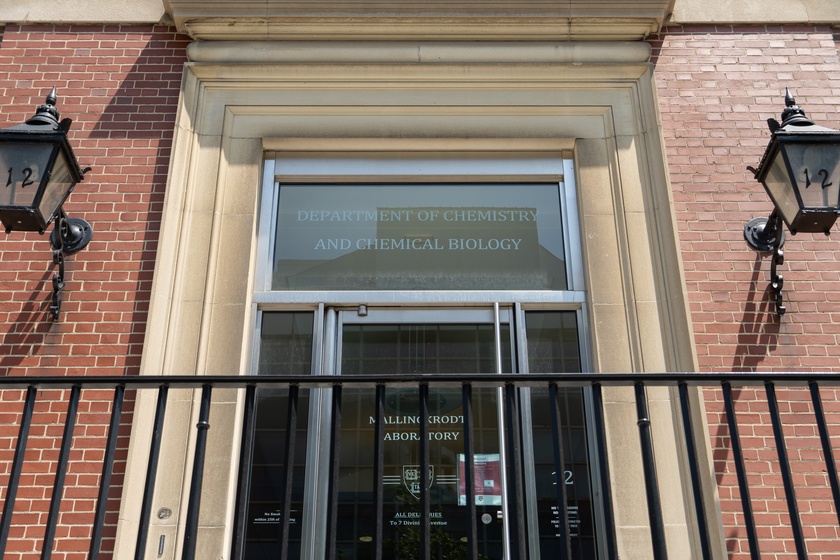{shortcode-c9cec05052f6068eb01314f844f75096fc171239}
{shortcode-be29865d8a9c7908fa05930b7f2d42574eaa573c}n the early ’90s, Logan S. McCarty ’96 could be found helping confused students navigate organic chemistry. He’s still doing it today.
Meeting in his office in the Science Center, Logan — as students and colleagues call him — welcomes us with a smile. His hair is slicked back and dyed pink, and he wears a graphic t-shirt that reads “show up for trans youth.” A brown messenger bag slouches against the wall of his office, covered in art ranging from kids’ finger paintings saying “I love you, happy birthday day daddy” to printouts of memes.
McCarty emanates an air of comfort: He’s no stranger to interviews. When The Crimson last profiled him in 2002, McCarty doubled as a Head Teaching Fellow for Chemistry 5: “Introduction for Principles of Chemistry” and a professional opera singer for Cape Cod Opera Company. Now, McCarty holds the title of Associate Dean of Science Education and is a lecturer for the popular yet notorious Chemistry 20: “Organic Chemistry.”
However, he resists traditional field boundaries, and also teaches courses in Physics, Applied Math, and even a Gen Ed about Generative AI. “There’s value to teaching outside of your own narrow specialty, because I think you can understand better how students might be approaching a subject where they haven’t been steeped in it for 30 years,” he remarks.
His love for teaching has remained constant since his time as a teaching fellow for Chemistry 5. He finds teaching introductory courses a particularly rewarding challenge, as they grapple with the foundational concepts of their respective fields. Teaching introductory courses “requires that you continually revisit them and ask, ‘what’'s actually the best way to explain this? How do these concepts connect? Am I really serving my students well and preparing them for future courses that they need to take?’”
At first glance, McCarty — who wears black and purple combat boots adorned with lilac laces — also seems far from his days as a professional opera singer. When he was last profiled by The Crimson 23 years ago, McCarty had just returned from a five-year gap in his Ph.D. studies, when he studied opera performance at the Longy School of Music and performed professionally. As he said in 2002, “I wouldn’t want to give up either of them, so I think I will keep teaching as my primary profession — but perhaps in high schools rather than college level — and pursue singing on the side.”
But McCarty’s balancing act has mostly held up: McCarty, though not currently practicing opera professionally, continues his passion for music as a member of the Jameson Singers, founded in 2010 by Jim Marvin, Director of Choral Activities at Harvard.
He decided to take the gap years when his advisor noticed his passion for singing and encouraged him to explore different life paths. Today, he doesn’t regret the unorthodox five years: “I'm not going to have a midlife crisis where, ‘Oh, what if I had been a professional singer’.’”
Now an advisor himself, McCarty passes down this same mindset to his advisees. He is often assigned first-years interested in the life sciences, but enjoys seeing students discover their own paths. “I hope that people can find their intellectual passion,” he says. “I also am perfectly happy if someone decides, ‘Actually, I don’t love doing science.’ Great. Go do what you’re passionate about.”
In Chem 20, McCarty hopes to teach his students about organic chemistry’s relevance, its growth in past decades, and “ultimately, how powerful it is.” He is inspired that through the class, students can go from seeing chemical symbols as meaningless scribbles to predicting how chemicals react and synthesizing molecules in a lab.
Inspired by his students’ resilience and passion for organic chemistry, McCarty has made it a point to continue cultivating an uplifting class culture through group homework problems, a 230-song-long Spotify playlist he plays during class, and dad-chemistry jokes, which McCarty humbly calls, “the intersection of the world's worst types of humor.”
McCarty is also excited to co-teach a new First-Year Seminar named “Genuinely Hard Problems in Science” in Fall 2025, alongside Molecular and Cellular Biology professor Jeff W. Lichtman. He hopes to encourage a new generation of Harvard students to push themselves to explore the unknown of science.
“If I had told myself back then that I was eventually going to be teaching Chem 20,” he says, smiling, “that would be a dream come true.”


